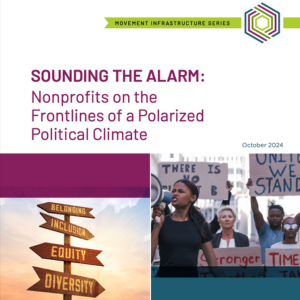Oct
24
2024
Nonprofits are facing a range of unique threats and challenges in today’s political climate. As the 2024 elections near, BMP is releasing a special report, Sounding the Alarm, to raise awareness about the negative consequences being experienced by nonprofits that are working on issues at play in this election – diversity, equity, and inclusion (DEI); immigrant rights; abortion access; LGBTQIA+ rights; and expressions of support on current issues such as Palestinian rights. Their experiences should sound an alarm for the nonprofit sector and movement groups as a whole, and catalyze stakeholders including philanthropic entities to offer interventions.
Our analysis, based on a survey of 553 nonprofit leaders as well as focus groups and one-on-one interviews, finds that many organizations addressing issues that make the headlines today are contending with negative consequences such as reputational damage, threats to organizational safety, and funding reductions. As a result, groups are being forced to make or consider program changes and shifts in how they characterize their work. Additional funding losses are also widely anticipated, with groups pointing to state and federal legal rulings, expected policy changes and the upcoming elections as direct and indirect influences.
Key Findings
• 73% of organizations on the frontlines of these issues have faced or are anticipating one or more of a range of negative consequences: threats to their reputation or to their office or personnel, or reductions in funding.
Of the 406 groups that experienced or anticipated negative consequences, 70% attributed that to their DEI efforts. A striking 44% of groups experienced or anticipated consequences for their expressions of support on current issues such as Palestinian rights (44%), followed closely by those working on LGBTQIA+ Rights (39%). About a third attributed consequences to their Immigrant Rights (30%) work, as did about a quarter of groups working on both Reproductive Rights (24%), and Education and Racial Equity (24%).
• Organizations that faced or anticipated negative consequences for their work in polarizing issue areas are seeking to insulate themselves and their programs from threats by making adaptations to bolster the safety and legitimacy of their work. For example, in an attempt to reduce negative consequences for their work, organizations are making changes to program language – including shifting away from race-explicit language. The strategy of shifting away from race-explicit language was particularly pronounced among organizations working on DEI issues, with 18% of those that faced negative consequences changing or considering changes to their communications around race.
• Organizations are also experiencing actual or anticipated funding losses. Almost half of the organizations expressing Public Support for Current Issues such as Palestinian rights (48%), DEI (47%), Immigrant Rights (47%), and LGBTQIA+ Rights (41%) anticipate a loss of funding. Anticipated funding losses not only impact the organizations that lose money, but also send a message to other groups about what may happen if they are working with similar populations or on similar issues.
Our interviews and focus groups also revealed a general sense of worry and concern among nonprofit leaders about how the attacks on race equity, free speech and protest, LGBTQ+ rights, abortion access, and immigrant rights may play out. Nonprofit leaders at the state and local levels are concerned about dehumanizing narratives, copycat policies to dismantle race equity programs, LGBTQIA+ care and abortion access, and investigations and insinuations about their work by the media and state level authorities.

